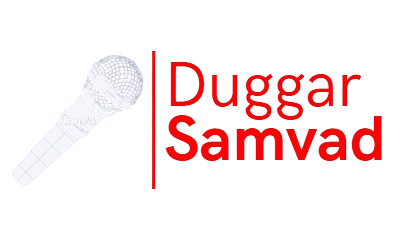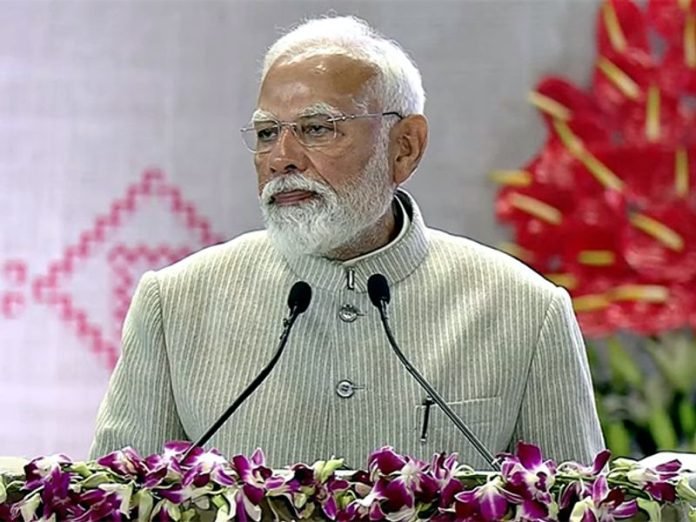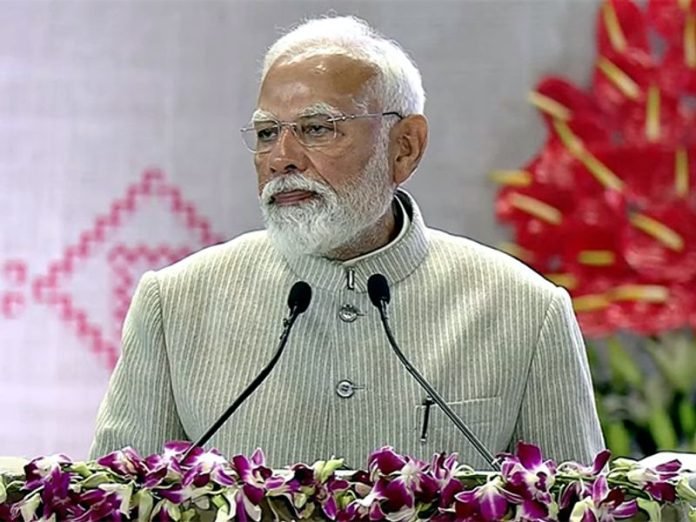Prime Minister Narendra Modi expressed confidence in the future of India’s textile sector on Sunday, stating that he is optimistic that the country will achieve its goal of Rs 9 lakh crore in textile exports ahead of the 2030 target.
Speaking at the Bharat Tex 2025, the country’s largest textile event being held in New Delhi, Modi noted that India is currently the 6th largest exporter of textiles and apparel globally, with exports valued at approximately Rs 3 lakh crore. He set a target to triple this figure and achieve exports worth Rs 9 lakh crore in the near future, underlining the substantial progress made in the sector due to consistent policies and hard work over the past decade.
“The mood I saw today at the exhibition gives me confidence that we may achieve these figures earlier than 2030,” Modi said, expressing optimism about the growth trajectory of India’s textile industry.
Modi highlighted that the success of India’s textile sector is attributed to consistent policy support, which has helped double foreign investment in the sector. He also pointed to the impressive 7% growth in textile and apparel exports, a sector that contributes 11% to the manufacturing sector and is a significant job creator.
The Prime Minister emphasized the need to focus on sustainability and the future of the textile industry, particularly in tackling fashion waste. He pointed out that by 2030, fashion waste is expected to reach 148 million tonnes, with a quarter of textile waste currently not being recycled. He urged the industry to transform this challenge into an opportunity, promoting efficient use of resources and minimal waste generation.
Regarding the new Cotton Mission announced in the General Budget 2025, Modi stated that it will play a pivotal role in enhancing cotton productivity, particularly extra-long staple cotton, ensuring a reliable cotton supply, and making Indian cotton globally competitive. He highlighted the mission’s importance in strengthening the value chain of the textile industry.
Additionally, Modi projected that India’s textile recycling market could reach USD 400 million in the coming years, while the global recycled textile market is estimated to reach USD 7.5 billion. He called on the textile industry to capitalize on this growing market share with the right direction.
The Prime Minister also urged the banking sector to recognize the unique needs of the textile industry, particularly in financing small textile units that employ large numbers of people. “One textile unit may need an investment of just Rs 75 crore but can employ up to 2,000 people,” he said.
Modi outlined his 5F vision for the textile sector – Farm to Fibre; Fibre to Factory; Factory to Fashion; Fashion to Foreign – a strategy aimed at creating new opportunities for farmers, weavers, designers, and traders, and promoting Indian textiles globally.
Addressing the future of the textile industry, Modi emphasized the importance of innovation and collaboration. He called on the textile sector to work with reputed institutions like IITs to develop new tools and technologies. He also pointed out that artificial intelligence is increasingly being used to forecast trends and create new styles in the textile market.
Modi praised the significant role that Bharat Tex is playing in boosting investment, exports, and growth in the textile industry, highlighting that over 120 countries are participating in the event. The exhibition provides entrepreneurs with the opportunity to expand their businesses from local to global markets.
The Prime Minister also lauded the efforts to promote the handloom sector, citing the success of geographical indication (GI) tagging, which has benefited handloom brands by increasing their recognition and market value. He called for the fusion of traditional and modern techniques to develop new products that appeal to youth both in India and internationally.
On sustainability, Modi announced that the textile ministry had signed an MoU with the Standing Conference of Public Enterprises and e-Marketplace to promote upcycling in the industry. He revealed that pilot projects for door-to-door collection of textile waste are being conducted in cities like Navi Mumbai and Bengaluru.
In closing, Modi expressed his vision for India’s textile industry to combine traditional sustainable techniques with cutting-edge technologies, benefiting artisans, weavers, and millions of women associated with the sector.
Bharat Tex 2025, taking place from February 14-17, continues to serve as a strong platform for global collaboration, investment, and innovation in the textile industry




